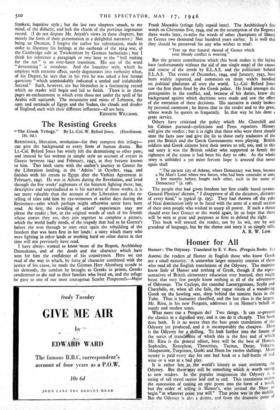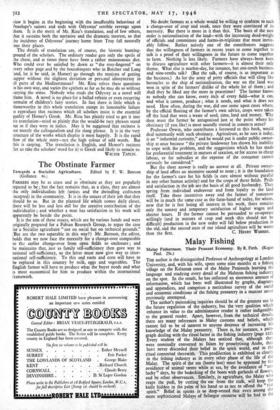Homer for All
Homer : The Odyssey. Translated by E. V. Rieu. (Penguin Books. ls.) AMONG the readers .of Homer in Fnglish those who know Greek are a small minority: =A somewhat larger minority consists of those who read all the English translations of the Odyssey. The majority know little of Homer and nothing of Greek, though if the repre- sentatives of British elementary education ever boasted, they might boast that very few people know nothing at all of the adventures of Odysseus. The Cyclops, the cannibal Laestrygonians, Scylla and Charybdis, or, when all else fails, the vague vision of a wandering Greek on the howling seas, sleep behind the stoniest faces in the Tube. Thus is humanity classified, and the last class is the largest. Mr. Rieu, in his new Penguin, addresses it on Homer's behalf in manly and modest tones.
What more can a Penguin do? Two things. It can re-present the classics in a dignified way, and it can do it, cheaply. This book does both. It is no worse than the best prose translations of the Odyssey yet produced, and it is incomparably the cheapest. Here is the Odyssey for shilling. To look further into the future of the series of translns of which this is the first and of which Mr. Rieu is the general editor, here will be the best of Homer, Sophocles, Xenophon, Theocritus, Tacitus, Dante, Voltaire, Maupassant, Turgeniev, Gorki and Ibsen for twelve shillings. More money is paid every day. for one bad book or a half-bottle of bad wine or a seat at a bad play.
It is rather late in the world's history to start reviewing the Odyssey. But there-may still be something which is worth saying to new readers. In the popular imagination the Odyssey is a string of tall travel stories laid end to end. This translation makes the concession of casting an epic poem into the form of a novel, but the order of telling is Homer's, who invited the Muse to begin "at whatever point you will." That point was in the middle. But the Odyssey is als-, a drama, and from the dramatic point of view it begins at the beginning with the insufferable behaviour of Penelope's suitors and ends with Odysseus' terrible revenge upon them. It is the merit of Mr. Rieu's translation, and of few others, that it sustains both the narrative and the dramatic interest, so that :he incidents of Odysseus' journey home from Troy fall naturally nto their places.
The details of translation are, of course, the historic hunting- ground of the scholars. The ordinary reader gets only the spoils of the chase, and at times these have been a rather monotonous diet. Who could ever be satisfied by dawn as "the rosy-fingered" on every other page and by the housekeepers who in Butcher and Lang and, let it be said, in Homer) go through the motions of getting
,upper without the slightest deviation or personal idiosyncrasy in ill parts of the Mediterranean? Mr. Rieu solves these questions .n his own way, and varies the epithets as far as he may do so without varying the sense. Nobody who reads the Odyssey as a novel will )lame him. A novel is no place for a ballad refrain or even recurring 'ormulx of children's fairy stories. In fact there is little which is tlameworthy in this whole translation except its lamentable failure o reproduce that raciness which all scholars insist is the essential luality of Homer's Greek. Mr. Rieu has plainly tried to get it into tis translation—tried so plainly that the would-be racy phrases stand )ut as if they were in italics. May it be suggested that raciness is tot merely the colloquialism and the slang phrase. It is in the very .tructure of the works which display it most happily. It is the rapid dow of the whole story—not the high colour of odd words. But this is carping. The translation is English, and Homer's raciness :let us take the scholars' word for it) is Greek and likely to remain so.
WALTER TAPLIN.































 Previous page
Previous page